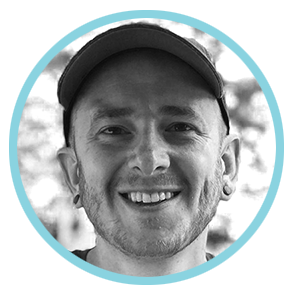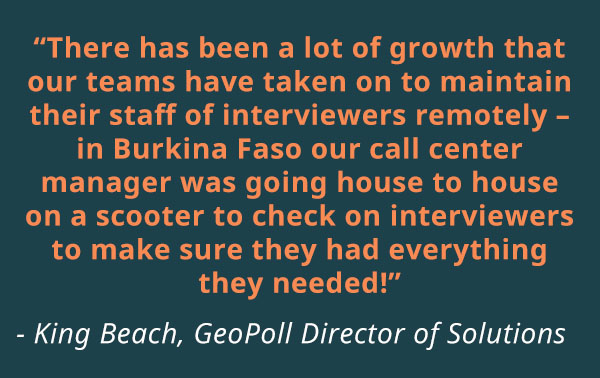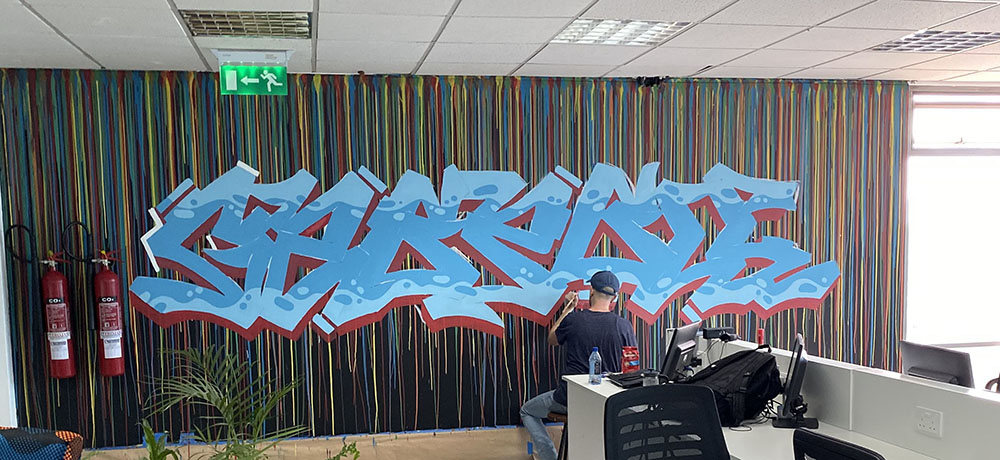- Contents
- Interview with King Beach
King Beach is the Director of Solutions at GeoPoll, a role in which he oversees GeoPoll’s call center operations in 60 markets around the world. He talked to Roxana Elliott about the shift towards Computer Assisted Telephone Interviewing, the challenges of overseeing call centers remotely during COVID-19, and more.
Interview with King Beach

Tell me about your background before you came to GeoPoll and what space you worked in
I started in survey research and social science research as an undergrad at Michigan State. My degree was in the natural science with an emphasis on research and scientific methods – I also worked with the Institute for Public Policy and Social Research to learn about survey research, designing surveys, managing call centers, and improving performance. I engaged on a lot of social norms surveys and health surveys, and I worked up from a interviewer to manager through undergrad, and then continued to work with that group before joining GeoPoll.
What drew you to GeoPoll and made you join the team? How long have you been at GeoPoll?
It sounded exciting – I found the position through AAPOR and it sounded like a good opportunity to get involved with new research methods. GeoPoll was also offering the opportunity to do multi-faceted components of the research, seeing the research lifecycle from questionnaire design to analysis. There are not a lot of organizations who let you do all of that. It was startup mentality and there was an interest in doing exploratory research that hasn’t been done before by testing and seeing what does and doesn’t work in market research.
Thinking about my roles within the company, oh boy! I came on as a research assistant and was mostly focused on survey operations and day to day project management. That evolved to managing teams related to the influx of SMS work that we had at the time, and growing survey operations from a team of 1-2 to a team of 15. Recently my work has transitioned over to CATI as clients are more interested in our ability to collect data through CATI. I now work on a wide variety of things surrounding our operations, from design of our mobile applications to client communications.
Can you briefly describe your current role at GeoPoll and main responsibilities?
The Solutions Team oversees our call center and in-person work in over 60 countries. We onboard, train, and provide standardized quality control with the local teams we work with for our CATI and CAPI surveys. This means meeting the teams, doing trainings, and making sure different groups can meet our standards for quality and oversight.
Within 2020 the big change has been transitioning from face-to-face to virtual training. In 2019 we had a large network of team members who could travel to countries to do work and face-to-face training, we had about 6 people (on the Solutions Team) on the road at any one time. We’ve reinvented that to do that virtually all over video meeting while still implementing the standards we had while in person. It has led to some challenges in communication but for the most part we’ve been successful in migrating to virtual oversight.
What is the biggest challenge in overseeing so many call centers in different regions?
 We’ve learned along the way that we need to have local partners in market who are on the ground to help co-design surveys, assist with trainings, provide feedback on questionnaires, and more. Gathering local context and constructive feedback through virtual meetings is crucial and we’ve bridged that gap by finding the right people in the right positions. Another thing is scaling given how much growth we’ve had in the past year – we’ve increased our CATI work 5-6x in the past year.
We’ve learned along the way that we need to have local partners in market who are on the ground to help co-design surveys, assist with trainings, provide feedback on questionnaires, and more. Gathering local context and constructive feedback through virtual meetings is crucial and we’ve bridged that gap by finding the right people in the right positions. Another thing is scaling given how much growth we’ve had in the past year – we’ve increased our CATI work 5-6x in the past year.
For call centers, oversight is challenging as we’ve seen when teams have gone remote in countries where working remote is not very common, there have been teething issues with staff who are not used to working at home. We are working in countries where people don’t work remotely so there has been a lot of growth that our teams have taken on to maintain their staff of interviewers remotely – in Burkina Faso our call center manager was going house to house on a scooter to check on interviewers to make sure they had everything they needed!
You mentioned the growth we’ve seen in CATI over the past year, largely due to restrictions around in-person research. Can you speak to that and if you think clients will stay with CATI now that they’ve tried it out?
It’s interesting as GeoPoll has been on the front of this for so long and you see these big shifts with how data is collected over time. On the consumer research side, I think the industry will stick with CATI work if they are still getting data they expect with the quality they expect at a cheaper price point. The advantage with CATI is that you can still do both quantitative and qualitative research and provide the same level of oversight as with CAPI. On the international development side, I do think more work will remain with CATI but very targeted projects may move back to CAPI.
What I’ve heard from our colleagues is that the CATI work and the quality of data we have provided is an eye opener for the industry which has led to more work with many clients. When they run the first couple projects with us they might be testing between modes, and they are pleased with the quality we provide so continue on.
What are you excited about in terms of where GeoPoll will go in the future?
What I’m most excited about is that we’ve found a way to be on the forefront of new research. We are able to offer clients a variety of ways to work with us and provide different forms of data. We’ve also found a way to adapt and expand what we do here at an unprecedented pace in terms of growth. A year ago we may have ran CATI in 20 markets and now we’re in 60. Being able to continue to expand to meet client’s needs is always interesting, whether that’s through new markets, approaches, or project design.

What’s a fact about yourself that people may not know right away?
I think you know most of these but I love art, cars, hiking and the outdoors. Street art is a fun one, and in most of the new offices we’ve opened I’ve done a mural for the office. I think I’ve done art in Africa in 5-6 different countries in our offices and even working with local art communities. It builds comradery with the rest of the team when I go out and share some personal art.
